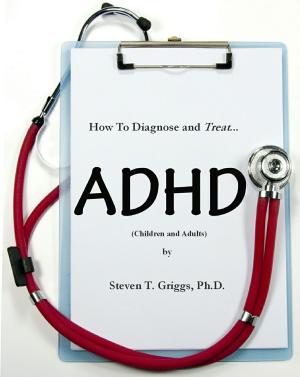The Psychology of Guilt
Nonfiction, Health & Well Being, Psychology, Cognitive Psychology, Self Help, Mental Health, Happiness| Author: | Steven T. Griggs, Ph.D. | ISBN: | 9781476229607 |
| Publisher: | Steven T. Griggs, Ph.D. | Publication: | April 8, 2012 |
| Imprint: | Smashwords Edition | Language: | English |
| Author: | Steven T. Griggs, Ph.D. |
| ISBN: | 9781476229607 |
| Publisher: | Steven T. Griggs, Ph.D. |
| Publication: | April 8, 2012 |
| Imprint: | Smashwords Edition |
| Language: | English |
Guilt symptoms vary but usually include an uneasy feeling, accompanied by anxiety. Anxiety signals underlying conflicts, which might not be within your awareness, hence the difficulty resolving the ambivalence.
Yes, guilt is a form of ambivalence--a more painful form than other common forms (procrastination and forgiveness). It is tougher to tackle than procrastination-related ambivalence, but usually not as deep or difficult as a third common form--forgivenes. Resolving ambivalence is no easy feat, but understanding this underlying dynamic is necessary if you want guilt (or those other two bad experiences )to go away.
In this ebook, I start out with some definitions, and then highlight the good and bad aspects of guilt. Yes, there are actually a few good things associated with guilt, but these are not the main focus of this ebook, because we all tend to focus on the uncomfortable parts. There's a discussion of guilt in the literature, divided into four parts--Evolutionary, Neurological, Social and Clinical.
What is the difference between guilt and shame? Guilt and Procrastination? Guilt and Anxiety? What are its specific dynamics? (Think sins of omission and sins of commission). I discuss common situations that create guilt--how others create guilt in you--and how to think about them so that guilt is just one possible experience, not the only one. I list at least a dozen irrational beliefs that make you vulnerable and another ten or so questions you can ask yourself to make these conscious. Then I list another dozen or more approaches to guilt described by other psychologists. (I didn't think of everything myself...) What are the functions of punishment? Pennance? Rationalization? Denial? Assertiveness? How do you sabotage assertivensss? (I list eight ways.) And last, I talk about guilt in relation to religion.
I sprinkle quotes throughout the text and include over two pages of them at the end. Some of them are thought-provoking, some are just funny. I like quotes because they make text more readable, plus give the reader a broader perspective. But, since I am a psychologist, the emphasis is on your experience of guilt and how to stop it. You can when you understand how it works and the underlying feeling you probably have that most miss. That feeling causes the ambivalence, which causes the anxiety, which causes you to avoid fixing this.
Clients are very enthusiastic about this ebook, probably because everyone can use some work on this issue, especially if you happen to be in a relationship.
"This e-book is phenomenal! I have dealt with guilt for years, though I’ve never had a good reason to, and I found this book empowering. Of course, I thought I had good reasons to feel guilty, but I didn’t realize just how irrational those reasons were. I learned that the feelings come from a struggle with ambivalence, being torn between two different sets of standards, neither of which were my own. I’ve always been a people-pleaser, and apparently had never found reason to stand my ground and create standards that were right for me. This has caused me immense resentment against those people in my life whose standards I felt pressured to meet. Reading this book was an eye-opener because it was like going down a checklist of a personal description. I didn’t understand that many of my decisions and thoughts were completely driven by guilt, and, had I not been educated through reading this book, I would have carried on in the same miserable pattern in ignorance." --B.B., Escondido, CA
Guilt symptoms vary but usually include an uneasy feeling, accompanied by anxiety. Anxiety signals underlying conflicts, which might not be within your awareness, hence the difficulty resolving the ambivalence.
Yes, guilt is a form of ambivalence--a more painful form than other common forms (procrastination and forgiveness). It is tougher to tackle than procrastination-related ambivalence, but usually not as deep or difficult as a third common form--forgivenes. Resolving ambivalence is no easy feat, but understanding this underlying dynamic is necessary if you want guilt (or those other two bad experiences )to go away.
In this ebook, I start out with some definitions, and then highlight the good and bad aspects of guilt. Yes, there are actually a few good things associated with guilt, but these are not the main focus of this ebook, because we all tend to focus on the uncomfortable parts. There's a discussion of guilt in the literature, divided into four parts--Evolutionary, Neurological, Social and Clinical.
What is the difference between guilt and shame? Guilt and Procrastination? Guilt and Anxiety? What are its specific dynamics? (Think sins of omission and sins of commission). I discuss common situations that create guilt--how others create guilt in you--and how to think about them so that guilt is just one possible experience, not the only one. I list at least a dozen irrational beliefs that make you vulnerable and another ten or so questions you can ask yourself to make these conscious. Then I list another dozen or more approaches to guilt described by other psychologists. (I didn't think of everything myself...) What are the functions of punishment? Pennance? Rationalization? Denial? Assertiveness? How do you sabotage assertivensss? (I list eight ways.) And last, I talk about guilt in relation to religion.
I sprinkle quotes throughout the text and include over two pages of them at the end. Some of them are thought-provoking, some are just funny. I like quotes because they make text more readable, plus give the reader a broader perspective. But, since I am a psychologist, the emphasis is on your experience of guilt and how to stop it. You can when you understand how it works and the underlying feeling you probably have that most miss. That feeling causes the ambivalence, which causes the anxiety, which causes you to avoid fixing this.
Clients are very enthusiastic about this ebook, probably because everyone can use some work on this issue, especially if you happen to be in a relationship.
"This e-book is phenomenal! I have dealt with guilt for years, though I’ve never had a good reason to, and I found this book empowering. Of course, I thought I had good reasons to feel guilty, but I didn’t realize just how irrational those reasons were. I learned that the feelings come from a struggle with ambivalence, being torn between two different sets of standards, neither of which were my own. I’ve always been a people-pleaser, and apparently had never found reason to stand my ground and create standards that were right for me. This has caused me immense resentment against those people in my life whose standards I felt pressured to meet. Reading this book was an eye-opener because it was like going down a checklist of a personal description. I didn’t understand that many of my decisions and thoughts were completely driven by guilt, and, had I not been educated through reading this book, I would have carried on in the same miserable pattern in ignorance." --B.B., Escondido, CA















